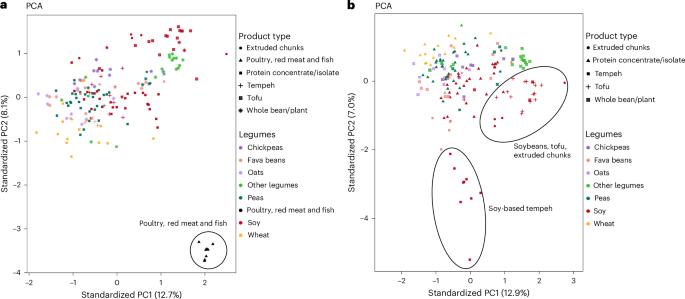Existing food processing classifications overlook the phytochemical composition of processed plant-based protein-rich foods
IF 21.9
Q1 FOOD SCIENCE & TECHNOLOGY
引用次数: 0
Abstract
According to existing food processing classification systems, plant-based protein-rich (PBPR) foods are often considered ‘ultra-processed’—and therefore perceived as unhealthy—despite their ability to provide various bioactive compounds beneficial for human health. Here we used a non-targeted metabolomics approach to analyse the impact of processing on the biochemical composition of PBPR foods. Our results show that existing food classification systems may provide questionable categories for PBPR foods without considering their overall biochemical composition, including phytochemicals. An analysis focusing specifically on biochemical compounds of soy-based products manufactured using various technologies showed no clear distinctions between processing groups in the principal component analysis based on the NOVA and Poti classification. However, clear differences were found between soy-based products based on their phytochemical profile. Although food processing classification systems are welcome in their attempt to guide consumers towards healthy choices, they should be improved to more accurately reflect the biochemical composition of PBPR foods. Although plant-based protein-rich (PBPR) foods contain nutritionally bioactive compounds, they are often classified as ultra-processed foods, which most consumers perceive as unhealthy. Using a non-targeted metabolomic approach, this study shows that existing food classification systems do not consider the biochemical composition of PBPR foods, potentially misleading consumers to avoid these products.


现有的食品加工分类忽视了加工过的富含植物蛋白的食品的植物化学成分
根据现有的食品加工分类系统,基于植物的富含蛋白质(PBPR)的食品通常被认为是“超加工”的,因此被认为是不健康的,尽管它们能够提供各种对人类健康有益的生物活性化合物。在这里,我们使用非靶向代谢组学方法来分析加工对PBPR食品生化成分的影响。我们的研究结果表明,现有的食品分类系统可能会对PBPR食品提供可疑的分类,而没有考虑它们的整体生化成分,包括植物化学成分。一项专门针对使用各种技术生产的大豆基产品的生化化合物的分析显示,在基于NOVA和Poti分类的主成分分析中,加工组之间没有明显的区别。然而,基于它们的植物化学特征,发现大豆基产品之间存在明显差异。尽管食品加工分类系统在引导消费者做出健康选择方面受到欢迎,但它们应该得到改进,以更准确地反映PBPR食品的生化成分。
本文章由计算机程序翻译,如有差异,请以英文原文为准。
求助全文
约1分钟内获得全文
求助全文

 求助内容:
求助内容: 应助结果提醒方式:
应助结果提醒方式:


